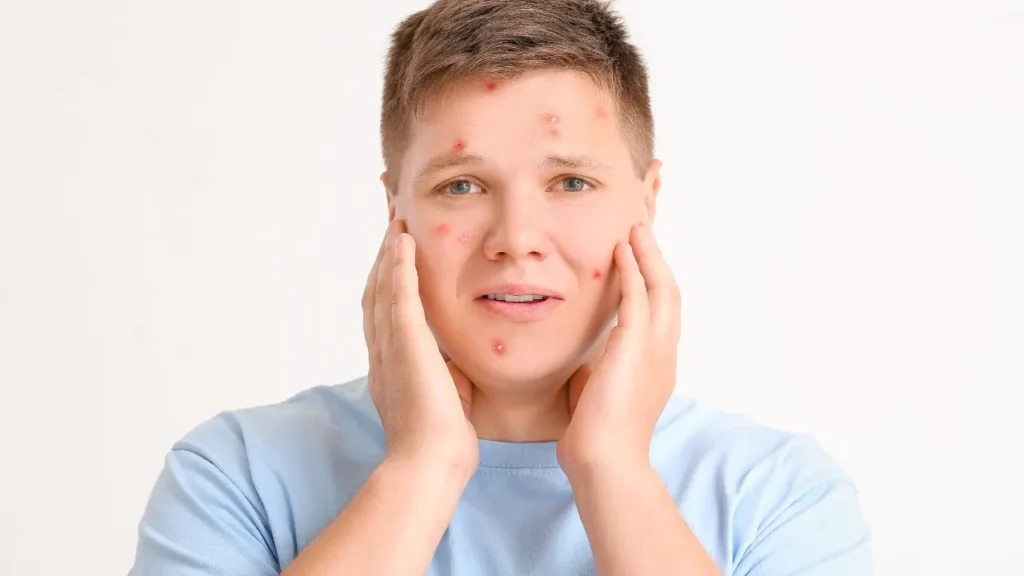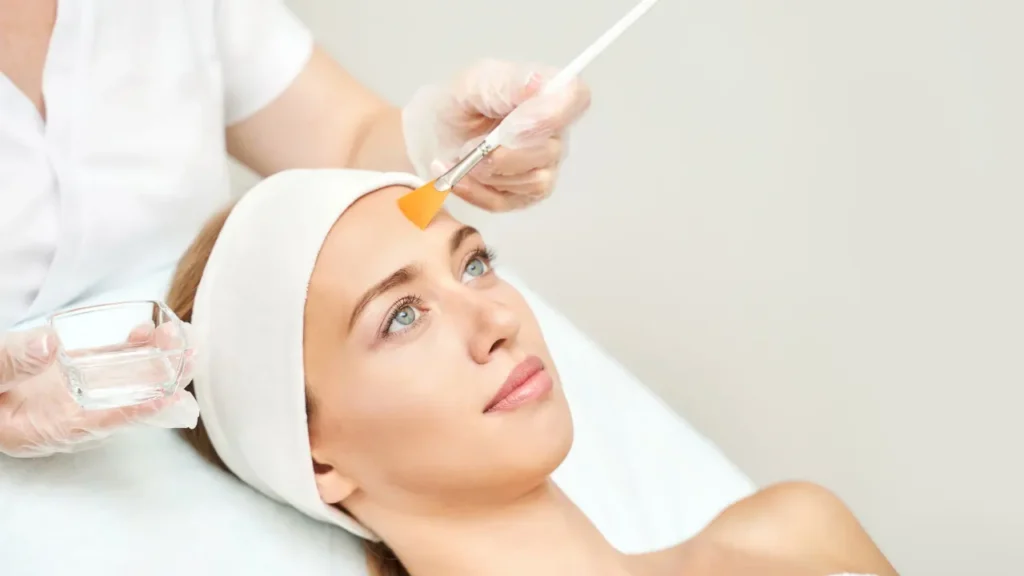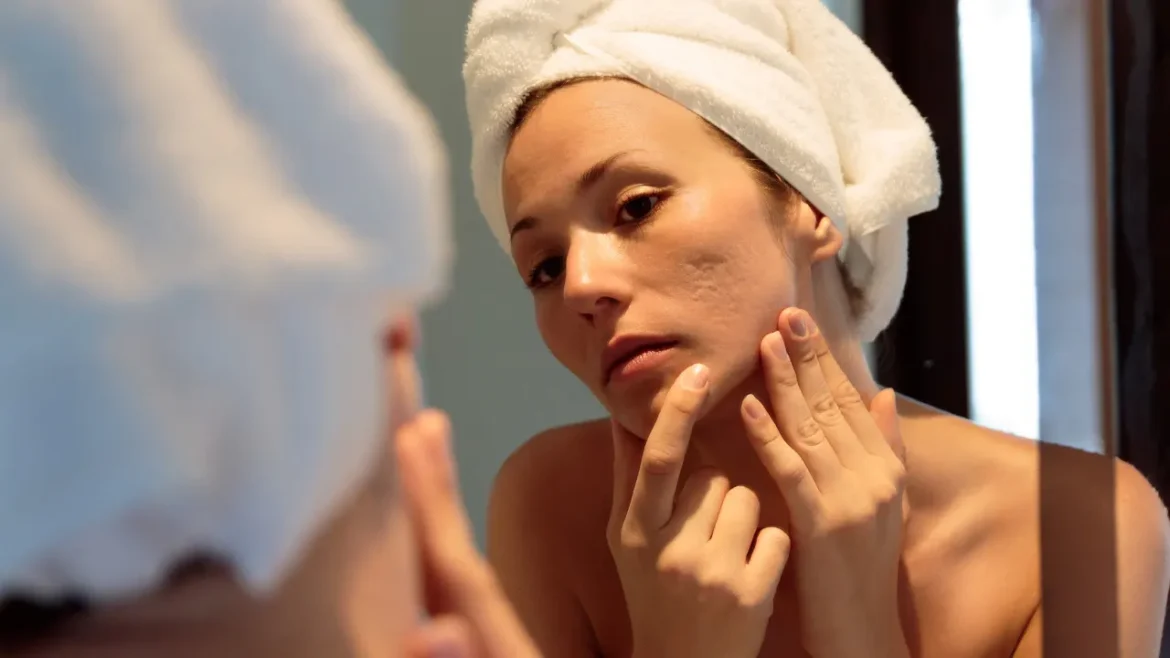Description
Acne lesions cause skin damage throughout the healing process, which leads to acne scarring. According to the severity of the acne alongside the healing procedure, the scars might differ in their appearance and size. Acne Scars can emerge as pigmented or discolored elevated or depressed patches on the skin. However, there is not one, universally effective treatment that is beneficial for all individuals when it comes to treating Acne Scars, which are common aesthetic disorders that can be challenging to heal. The different kinds of Acne Scars, potential causes, aggravated and alleviated variables, conventional treatment regimens, and alternative medical solutions, such as prescription drugs, over-the-counter medicines, and dietary supplements, will all be covered in this article.
Types
Acne Scars can take a variety of forms, which include keloids, hypertrophic scars, and atrophic scars. The most frequent scars are atrophic scars, which are further classified into boxcar, rolling, and ice pick scars. Ice pick scars resemble puncture wounds because they are deep and thin. Rolling scars appear smooth and shallow, whereas boxcar scars are larger and possess sharper edges.
When the body makes excess collagen during the course of healing, it creates keloids and hypertrophic scars, which are elevated, thick scars. Although keloids can extend past the initial wound region, hypertrophic scars are usually limited to the region of the initial wound.
You May Also Like:
OLLY GOODBYE STRESS GUMMIES REVIEWED: A LEADING STRESS RELIEF PRODUCT
NATURE MADE ASHWAGANDHA GUMMIES REVIEWED: A LEADING PRODUCT FOR STRESS SUPPORT
Acne Scars: Description, Causes, and Treatment Protocol is an original (HealthXWire) article.
Possible Causes
Scars from acne are a result of inflammation-induced skin damage. The skin may become elevated, pitted, or discolored after acne lesions have healed. Acne scars might appear for a variety of reasons, though their precise etiology is yet unknown. These elements consist of:
Genetics: According to their genetic makeup, some individuals are more likely than others to have acne scars. Acne scars run in families, so those who have them are more prone to get them.
Squeezing or picking acne lesions: Persons who squeeze or pick at acne lesions risk damaging the skin and leaving scars. To reduce the chance of scarring, acne lesions must never be squeezed or picked.
Hormonal changes: Scars from acne can also be influenced by hormones. Acne outbreaks might result from hormonal changes increasing oil production. Hormonal changes may additionally result in skin irritation and scarring.
Skin type: Acne scarring may be more common in people with specific skin characteristics, for instance, sensitive or oily skin.
Severe acne: As a result of severe acne-related skin inflammation, the skin’s tissue might get harmed and scarred. Scarring is more likely to occur in cases of severe acne. With respect to how severe the acne was, scars from acne may vary from moderate to severe.
Underlying medical condition: Owing to underlying medical issues, including autoimmune illnesses, which can irritate the skin, certain individuals may get acne scars.
Exposure to sunlight: Acne scars might look worse if they are exposed to the sun. The skin may create more melanin as a result of exposure to the damaging ultraviolet (UV) rays of the sun, which can result in hyperpigmentation, thereby rendering acne scars prominent. Acne scars may become more obvious due to the skin losing its suppleness as a result of sun damage.

Exacerbating and Mitigating Factors
Acne scarring can be exacerbated or reduced by a number of circumstances. Squeezing or picking pimples might damage one’s skin and raise the risk of scarring, which are aggravating factors. Genetics can also be a factor because some individuals scar more easily than others. Smoking, sunlight exposure, and inadequate wound healing are among additional variables that might worsen scarring.
One of the mitigating variables is the early and effective therapy of acne, which can lessen the intensity and length of outbreaks as well as the chance of scarring. Scarring can also be decreased by refraining from squeezing or picking pimples. Proper wound care may speed up healing and lessen the chance of scarring by keeping the affected region clean and hydrated.
Standard Treatment Protocols
The intensity and kind of scarring affect the typical treatment procedures for acne scars. Acne scar treatment options include over-the-counter products, prescription drugs, and aesthetic surgeries.
Over-the-counter Formulations: The appearance of moderate acne scars might be improved with over-the-counter products like silicone sheets and scar gels. These cosmetics operate by maintaining hydrated skin and encouraging collagen synthesis, which can improve the texture of the skin.
Prescription Medications: Acne scar treatment is also possible with prescription drugs. By encouraging the creation of collagen, topical retinoids like tretinoin and adapalene may assist in minimizing the look of atrophic scars. By lowering inflammation and encouraging collagen breakdown, corticosteroid injections may prove beneficial for minimizing the look of keloid and hypertrophic scars. Through skin exfoliation and collagen production, other prescription drugs like beta-hydroxy acids and alpha-hydroxy acids may also reduce the visible signs of acne scars.
Cosmetic Procedures: People with severe acne scars may benefit from cosmetic procedures like chemical peels, laser resurfacing, dermabrasion, and microdermabrasion. These processes function by scraping off the outermost layer of the skin and promoting collagen formation, which can make scars seem better. Usually, dermatologists or plastic surgeons carry out these operations.

Treatment Options
There are a number of alternative treatment possibilities for acne scars, such as nutritional supplements, herbal therapies, and natural cures, in addition to conventional treatment protocols, which are as follows:
Nutritional Supplements: A number of nutritional supplements support healthy skin and decrease the visibility of acne scars. which include:
- Vitamin C
Strong antioxidant vitamin C works to shield the skin against free radical damage that may promote the formation of acne scars. Since it encourages tissue repair and regeneration, vitamin C also has a significant role in the formation of collagen and may assist in making scars look less noticeable.
- Zinc
In order to heal and regenerate damaged tissue, zinc functions by encouraging the creation of collagen. A structural protein, collagen, provides one’s skin with elasticity, toughness, and resilience. Additionally, zinc possesses anti-inflammatory qualities that may help lessen the swelling and redness linked to acne scars. Additionally, zinc assists in controlling skin oil secretion, which can stop the growth of fresh acne lesions and additional scarring.
- Vitamin E
Another antioxidant with proven advantages for skin health is vitamin E. Vitamin E, similar to vitamin C, helps to shield the skin from oxidative damage and encourages the formation of collagen. Additionally, vitamin E possesses anti-inflammatory properties that may help decrease the redness and inflammation linked to acne scars.
- Omega-3 fatty acids
Important fatty acids like omega-3 are crucial for keeping healthy skin. Such fatty acids may minimize swelling and increase skin moisture, which can decrease the visibility of scars.
- Probiotics
Probiotics are good bacteria that can benefit the health of one’s gut, which is crucial for overall health and the health of the skin. Probiotics help decrease inflammation and enhance the functioning of skin barriers, which can help decrease the visibility of scars, according to research studies.
Natural Remedies: There are some herbal and natural treatments that can be used in conjunction with these professional therapies and may even aid in boosting the effectiveness of conventional therapies.
- Aloe vera
Aloe vera is among the most popular all-natural treatments for acne scars. Numerous active substances found in aloe vera can aid in reducing inflammation and accelerating healing. Acne scars can be less noticeable, and the development of fresh healthy skin cells may be promoted by the topical application of aloe vera gel on the affected region.
- Honey
Honey, which possesses anti-inflammatory and antibacterial characteristics, is another natural remedy that might prove useful for acne scars.
- Green tea
Another all-natural substance with possible advantages for treating acne scars is green tea extract. Catechins, potent antioxidants found in green tea, may safeguard skin from damage caused by free radicals and encourage tissue regeneration and healing. Additionally, green tea extract possesses anti-inflammatory qualities that assist in minimizing the redness and inflammation that are connected to acne scars.
Herbal Remedies: A wide variety of herbal treatments are also available that may be beneficial for acne scars, like chamomile, because of its anti-inflammatory effects. Centella asiatica, sometimes called gotu kola, constitutes one of the most widely used plants. The visibility of scars may be lessened by this herb’s ability to speed up wound healing and encourage collagen formation.

Conclusion:
All human beings, at some point in their lives, experience blemishes on the skin. Some of these blemishes can be categorized as acne. When the experience of acne can be universal, a precise treatment for acne scars is not universal for all sufferers. There are various types of acne, as well as various types of traditional and non-traditional treatments. The circumstances that create acne and lead to acne scars are varied as well. It can take time and effort to accurately determine what congenital and/or external factors contribute to the presence of a person’s acne. Please take this information into consideration when determining which treatment for acne scars is best for you.

1. “Acne Scars.” Retrieved from: https://my.clevelandclinic.org/health/diseases/21222-Acne-Scars
2. “Acne Scars: Consultation and Treatment.” Retrieved from: https://www.aad.org/public/diseases/Acne/derm-treat/Scars/treatment
3. “Acne.” Retrieved from: https://www.drugwatch.com/health/Acne/Scars/
4. “How to best treat acne scars.” Retrieved from: https://www.medicalnewstoday.com/articles/324784#natural-remedies
Important Note: The information contained in this article is for general informational purposes only, and should not be construed as health or medical advice, nor is it intended to diagnose, prevent, treat, or cure any disease or health condition. Before embarking on any diet, fitness regimen, or program of nutritional supplementation, it is advisable to consult your healthcare professional in order to determine its safety and probable efficacy in terms of your individual state of health.
Regarding Nutritional Supplements Or Other Non-Prescription Health Products: If any nutritional supplements or other non-prescription health products are mentioned in the foregoing article, any claims or statements made about them have not been evaluated by the U.S. Food and Drug Administration, and such nutritional supplements or other health products are not intended to diagnose, treat, cure, or prevent any disease.
Table of Contents


